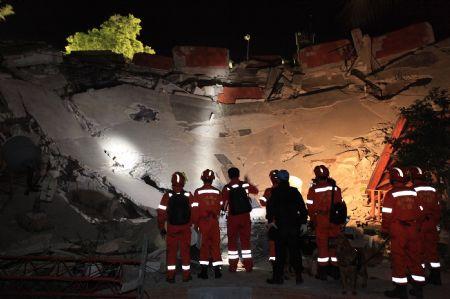Chinese doctors in action to assist quake-devastated Haiti
2010-01-15 08:04 BJTSpecial Report: Strong Quake Hits Haiti |
PORT-AU-PRINCE, Jan. 14 (Xinhua) -- A wood board improvised as a table with all medicine on it -- this is a "mobile hospital" the Chinese rescue team was able to set up to treat those injured in Haiti's capital city Port-au-Prince after the 7.0-magnitude earthquake hit the impoverished Caribbean country on Tuesday.
A large number of injured Haitians have stood in line waiting to be treated by the Chinese doctors on the plaza in front of the quake-affected Prime Minister's Office building.
 |
| Members of a Chinese emergency rescue team inspect the collapsed building of the headquarters of the UN Stabilization Mission in Port-au-Prince, Haiti, Jan. 14, 2010. The Chinese emergency rescue team arrived in Haiti's capital Port-au-Prince early Thursday local time, to help the rescue operation after an earthquake in which up to 100,000 people are feared dead and eight Chinese are still missing.(Xinhua/Xing Guangli) |
Five patients at a time were carried to the humble "mobile hospital" by volunteers. Most of them suffered physical traumas and the long-time exposed wounds were infected in many of the cases, Hou Shike, chief doctor of the rescue team told Xinhua on Thursday.
The Chinese doctors expressed their sorrow for the lack of medication supplies in Haiti, a country believed to be the poorest of the western hemisphere.
"Doctors and medicine are of great need here," Hou said in a painful tone. With each "Merci (Thank you)" from a cured patient, the medicine that the rescuer brought from China becomes less.
"Now we see the patients are still able to move. But when the infection gets worse, the consequences will be critical," Hou said, apparently worried.
"I hope there are more rescue teams joining us," he said.
Related stories
- Chinese experess sympathy, willingness to help to Haiti quake victims 2010-01-14
- Chinese rescue team arrives in Haiti 2010-01-14
- China actively involves in rescue work in Haiti 2010-01-14
- China's rescue team arrives in Haiti 2010-01-14

 Mail
Mail Share
Share Print
Print


 Video
Video









 2009 China Central Television. All Rights Reserved
2009 China Central Television. All Rights Reserved